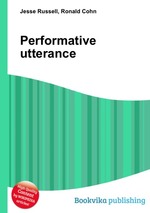Performative utterance
Jesse Russell Ronald Cohn
бумажная книга
High Quality Content by WIKIPEDIA articles! The notion of performative utterances was introduced by language philosopher J. L. Austin. According to his original conception, it is a sentence which does something in the world rather than describing something about it. For example, the statement "I now pronounce you man and wife," is not true or false but instead `happy` or `unhappy`, depending on whether or not it is performed properly (by an ordained minister, before a single man and woman, etc.). The performative is uttered in the performance of an illocutionary act and is either felicitous (successful) or infelicitous (unsuccessful) rather than true or false. Austin originally assumed that stating something and performing an illocutionary act are mutually exclusive. The term remains an important linguistic concept, though it has undergone significant criticism and modification since Austin introduced it. More recent writers (Eve Sedgwick, Jacques Derrida, Michel Foucault, Judith Butler) continue to use the term but in quite different ways.


